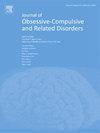Social networks in the context of hoarding disorder: A cross-sectional study
IF 1.5
4区 医学
Q3 PSYCHIATRY
Journal of Obsessive-Compulsive and Related Disorders
Pub Date : 2025-03-07
DOI:10.1016/j.jocrd.2025.100949
引用次数: 0
Abstract
Hoarding disorder is characterised by distress and difficulty in discarding items, leading to excessive accumulation. People with hoarding disorder experience difficulties in social relationships, including familial conflict and frustration, and less adaptive interpersonal styles. Analysing their social networks can help develop interventions for improved interpersonal functioning. This research investigated social network structure (size and frequency of contact), social isolation and loneliness in relation to hoarding disorder, accounting for depression. Participants (N = 158) completed online questionnaires including measures of hoarding severity, social network structure, loneliness, conditions and functioning in the home, and depression. Hoarding symptom severity was negatively correlated with social network size and strength of relationship with neighbours while controlling for depression. Loneliness, however, was better predicted by depression rather than hoarding. We also compared participants who met criteria for a diagnosis of hoarding disorder (n = 57) and 60 healthy controls, controlling for both age and depression. People with hoarding disorder had significantly weaker family networks and stronger feelings of loneliness. Depression, but not hoarding symptoms, correlated with risk of social isolation. Among participants with hoarding, social network size was negatively correlated with functional interference (activities of daily living) and conditions in the home. Our findings stress the need for addressing social functioning when treating hoarding. Depression, integrally related to hoarding and social functioning, also needs to be considered.
囤积障碍背景下的社会网络:一项横断面研究
囤积症的特征是痛苦和难以丢弃物品,导致过度堆积。囤积症患者在社会关系方面存在困难,包括家庭冲突和挫折,以及适应性较差的人际关系方式。分析他们的社会网络可以帮助制定改善人际关系功能的干预措施。这项研究调查了社会网络结构(规模和接触频率)、社会隔离和孤独与囤积症的关系,这是抑郁症的原因。参与者(N = 158)完成了包括囤积严重程度、社会网络结构、孤独感、家庭状况和功能以及抑郁程度的在线问卷调查。囤积症状严重程度与社会网络规模和邻居关系强度呈负相关,并控制抑郁。然而,抑郁比囤积更能预测孤独。我们还比较了符合囤积障碍诊断标准的参与者(n = 57)和60名健康对照者,控制年龄和抑郁。囤积症患者的家庭网络明显较弱,孤独感更强。抑郁,而不是囤积症状,与社会孤立的风险相关。在囤积者中,社交网络的大小与功能干扰(日常生活活动)和家庭条件呈负相关。我们的研究结果强调了在治疗囤积症时解决社会功能问题的必要性。与囤积和社会功能紧密相关的抑郁症也需要考虑。
本文章由计算机程序翻译,如有差异,请以英文原文为准。
求助全文
约1分钟内获得全文
求助全文
来源期刊
CiteScore
4.00
自引率
5.60%
发文量
46
审稿时长
47 days
期刊介绍:
Journal of Obsessive-Compulsive and Related Disorders (JOCRD) is an international journal that publishes high quality research and clinically-oriented articles dealing with all aspects of obsessive-compulsive disorder (OCD) and related conditions (OC spectrum disorders; e.g., trichotillomania, hoarding, body dysmorphic disorder). The journal invites studies of clinical and non-clinical (i.e., student) samples of all age groups from the fields of psychiatry, psychology, neuroscience, and other medical and health sciences. The journal''s broad focus encompasses classification, assessment, psychological and psychiatric treatment, prevention, psychopathology, neurobiology and genetics. Clinical reports (descriptions of innovative treatment methods) and book reviews on all aspects of OCD-related disorders will be considered, as will theoretical and review articles that make valuable contributions.
Suitable topics for manuscripts include:
-The boundaries of OCD and relationships with OC spectrum disorders
-Validation of assessments of obsessive-compulsive and related phenomena
-OCD symptoms in diverse social and cultural contexts
-Studies of neurobiological and genetic factors in OCD and related conditions
-Experimental and descriptive psychopathology and epidemiological studies
-Studies on relationships among cognitive and behavioral variables in OCD and related disorders
-Interpersonal aspects of OCD and related disorders
-Evaluation of psychological and psychiatric treatment and prevention programs, and predictors of outcome.

 求助内容:
求助内容: 应助结果提醒方式:
应助结果提醒方式:


